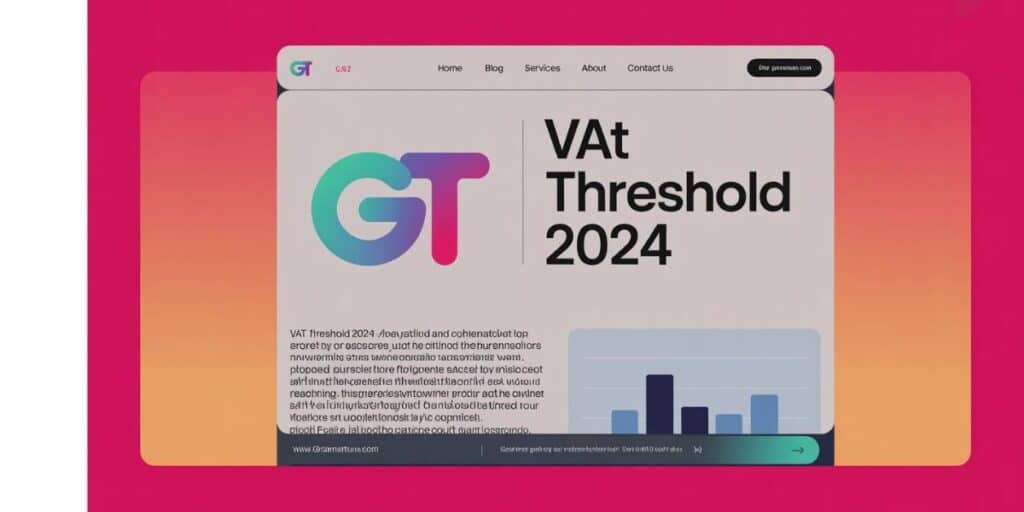Thinking about crossing the VAT threshold 2024? For thousands of UK businesses reaching that point every year, you’re not alone. Here’s what you need to know before it affects your bottom line.
📌 Policy and Legislative Content (Official/Regulatory Focus)
This VAT threshold change would primarily affect the small businesses whose taxable turnover ranges between these two values.
It is expected that the threshold would relieve compliance costs and minimization of red tape burdens to the tune of an estimated 28,000 businesses.
General description of the measure
Hence, the policy change raises the VAT registration threshold, allowing a larger number of small businesses to remain outside the realm of the VAT system.
Policy objective
VAT threshold 2024 continued support for this commitment is in line with the government’s general aim of encouraging high wages at high skills levels.
Background to the measure
Identifying the small business challenges, the government will raise the threshold up to £90,000. It will be the first increase in seven years.
Detailed proposal
The proposition raises the VAT registration threshold to 90,000 and the deregistration threshold at 88,000. The new provisions will take effect from 1 April 2024 and would help about 28,000 companies in terms of reduced VAT obligations.
Operative date
New VAT registration and deregistration criteria would commence with effect from April 1, 2024.
Current law
The proposed amendment is bringing this threshold amount to £90,000.
Proposed revisions
Increase in VAT registration threshold to £90,000 and an increase in deregistration threshold to £88,000 are the revisions proposed in the government’s policy proposal.
Summary of impacts
- Economic impact:Do not expect any significant macroeconomic effects.
- Impact on individuals, households, and families:It brings up to no impacts on individuals or families at all.
- Estimated continuing impact on administrative burden (£million): An estimated £5 million annual saving in administrative costs for businesses.
- Operational impact (£million) (HMRC or other): Minimal additional costs for HMRC to support businesses in adjusting to the new thresholds.
- Other impacts: No other significant impacts identified.
Monitoring and evaluation
The impact of the measure will be monitored through information collected from tax returns and receipts to assess its effectiveness and any unintended consequences.
Further advice
For more information or specific inquiries, businesses can contact Anne Hurst at HMRC via telephone: 03000 540845 or email: anne.hurst@hmrc.gov.uk.
💼 VAT-Specific Guidance (Business/Practical Focus)
What is VAT?
Value-added tax or VAT is a kind of tax on consumption payable on goods and services by the government.
In fact, as a rule, businesses are subject to VAT on most of the purchases that they do for commercial purposes and can subsequently recover it from the government.
What is the current VAT registration threshold in the UK?
Effective from 1 April 2024, the VAT registration threshold in the UK will be set at £90,000. Should any taxable turnover surpass this threshold, it becomes mandatory to register for VAT purposes.
What is taxable turnover?
Taxable turnover refers to the total worth of all sales liable to VAT. These include sales of outputs that are standard-rated, reduced-rated, or zero-rated
What happens if a business exceeds the VAT threshold?
Any business having taxable turnover in excess of GBP 90,000 in any consecutive twelve-month period is regarded as a taxable person liable to register for VAT within thirty days.
Register for VAT on time
In case the businesses exceed the threshold limit for VAT registration, it must register its name within thirty days. Any delay in this process will draw penalties for the business along with interests for overdue VAT.
Start charging VAT on sales
Upon registration, the business is obligated to charge VAT on its sales and issue VAT invoices. An entity is required to maintain VAT records and files VAT returns to HMRC.
File VAT returns and pay HMRC
Typically, businesses registered for VAT file VAT returns every quarter and make any necessary VAT payments to HMRC.
The return accounts for the VAT rented out by the business on sales and the VAT paid by that business on purchases.
Can businesses register for VAT voluntarily?
Yes, businesses with taxable turnover below the threshold may opt for voluntary VAT registration.
Benefits of voluntary VAT registration
- Avoid future registration: Voluntary registration can prevent the need to register later if turnover increases.
Drawbacks of voluntary VAT registration
- Administrative burden: Managing VAT records and returns might take time.
- Cash flow: Businesses pay VAT on sales, which might hamper cash flow.
- Complexity: VAT regulations can be tricky to understand and comply with.
You will be must like reading about: Letter or Alphabet: Understanding the Difference
Conclusion
In 2024, with the revised VAT threshold, small businesses in the UK can heave a collective sigh of relief as the new registration threshold now stands at £90,000..
The relief reduces compliance burden and allows thousands of businesses to thrive without worrying about VAT liability.
Stay on top of thresholds and put into effect the necessary measures early—proactivity in VAT will keep you compliant with and competitive in the year 2024.
FAQ,S
Who needs to register for VAT in 2024?
Any UK business with a taxable turnover over £90,000 must register.
Can I register for VAT below the threshold?
Yes, voluntary VAT registration is allowed and can offer tax benefits.
What is taxable turnover?
It’s the total value of goods and services not exempt from VAT.

Joulia, a seasoned wordsmith and grammar enthusiast, brings over a decade of blogging expertise to Grammar Tune. With a keen eye for linguistic precision and a passion for making complex grammar concepts accessible, he has helped thousands of readers enhance their writing skills. His engaging teaching style and practical approach to language learning have made him a trusted voice in the online grammar community.







